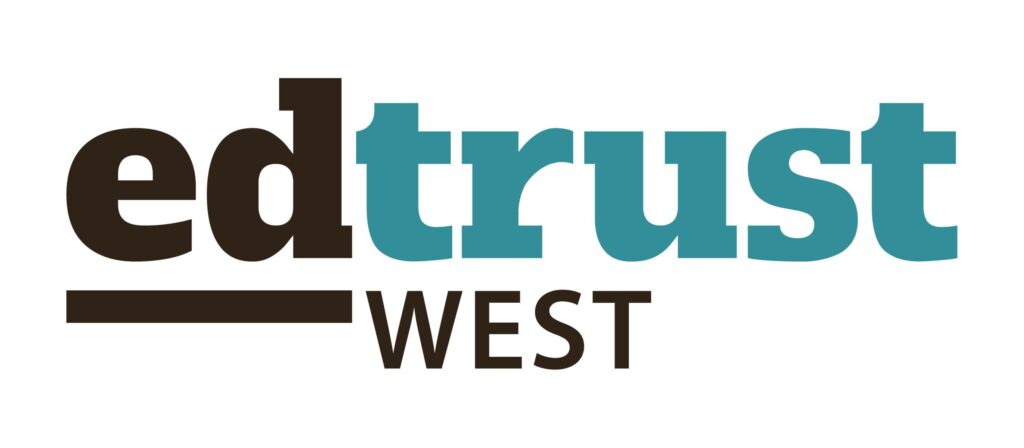At The EdTrust-West (EdTrust), we’re dedicated to a more equitable California for the students who have been systematically shut out from opportunity. We understand that changing our educational systems so they are more equitable takes money.
Now that tax season has passed, we know how much revenue we’re working with: a whopping $55 billion more than the Governor anticipated in January. We knew to expect a historic surplus, but this sum surpassed our expectations.
It’s a tremendous amount of resources, but the needs of Californians are equally massive. We’re more than two years into a pandemic that has hit all Californians hard, but none more so than families of color and those earning lower incomes. For many children and young people that means their lives, including their learning, have been disrupted and the inequities that already affected them have only intensified. As our Executive Director, Dr. Christopher J. Nellum puts it, “The moment is historic; the state’s tremendous surplus represents an opportunity to meet it with a similarly historic transformation of our education systems.”
Here’s how the revised budget proposal, issued earlier this month, measures up:
Early Learning and Care
A number of critical investments demonstrate Governor Newsom’s continued commitment to the early learning and care system. These include extending family fee waivers for children enrolled in state-subsidized preschool and child care and development programs and reimbursing state-subsidized preschool and child care and development programs for authorized hours of care, regardless of student attendance. And as the state and its partners work toward a single reimbursement rate structure, this budget provides one year of rate increases that amount to crucial support for an industry decimated by the pandemic.
And during the coming years of transition into universal transitional kindergarten, this budget allows for a key pipeline of qualified new teachers from the early learning and care space by temporarily waiving some credential requirements for preschool teachers with bachelor’s degrees if they meet basic skills requirements.
However, despite these promising initiatives, we look forward to working with the Legislature to find solutions for a clear and accessible early learning and care data system that helps ensure children of color, those living in low-income communities, and dual-language learners are benefiting from the investments as part of the Master Plan for Early Learning and Care.
K-12
We are delighted to see the $385 million proposal for STEM teacher professional development included in the May Revision. We have been advocating for this with our co-sponsors, the California Association of Science Educators, to ensure math and science instruction promotes equity and excellence. Low-income students and students of color will benefit greatly from this investment.
The increases to both the Community Schools Program and the Expanded Learning Opportunities Program, as well as the investment in continuing the Community Engagement Initiative, are all steps in the right direction. However, we would also like to see an equitable distribution of the Discretionary Block Grant, since local education agencies (LEAs) serving marginalized students are experiencing more challenges related to staffing, student learning, and student and staffing mental health and wellness than other LEAs. We would also like to see the state take a more central role in providing guidance to LEAs on how all these new programs should be working together to serve students and transform our schools, as well as ways to streamline the planning and reporting for various block grants.
Higher Education
We’re satisfied with the base budget that Governor Newsom has proposed for UC, CSU, and the California Community Colleges, especially with the multi-year funding increases for each system. Generally, multi-year funding for higher education is good, as it allows the systems to plan and execute strategies for improvement, and this case is no different. This budget—both in size and multi-year predictability—will allow the state’s public colleges and universities to spend with an eye toward reimagined, sustainable systems that meet their students’ needs even better than before.
However, we still have two equity-related concerns when it comes to the higher education budget: financial aid and remedial education. The Cal Grant program must keep pace with the cost of attending higher education; that requires reforming state financial aid so it reaches more students with greater assistance. Remedial education courses keep students (disproportionately Black and Latinx students) in a detrimental cycle of spending time and money on coursework that does not count toward transferring or a degree. Over the next few weeks, we’ll be asking the Legislature to implement AB 1746 (Medina) through the budget to raise award levels and reach more students with financial aid. We’ll also be asking legislators to approve a request for $64 million to help community college faculty redesign courses and instructional strategies to support students without remedial courses. If addressed in the final budget, both of these improvements would go a long way toward ensuring an equitable, accessible pathway to students’ postsecondary goals.
In the weeks to come, we’re looking forward to working with the Legislature to strengthen this budget proposal so it truly puts equity at the center of California’s recovery. Doing any less would only perpetuate the inequities in our education systems that students of color have experienced for far too long.

